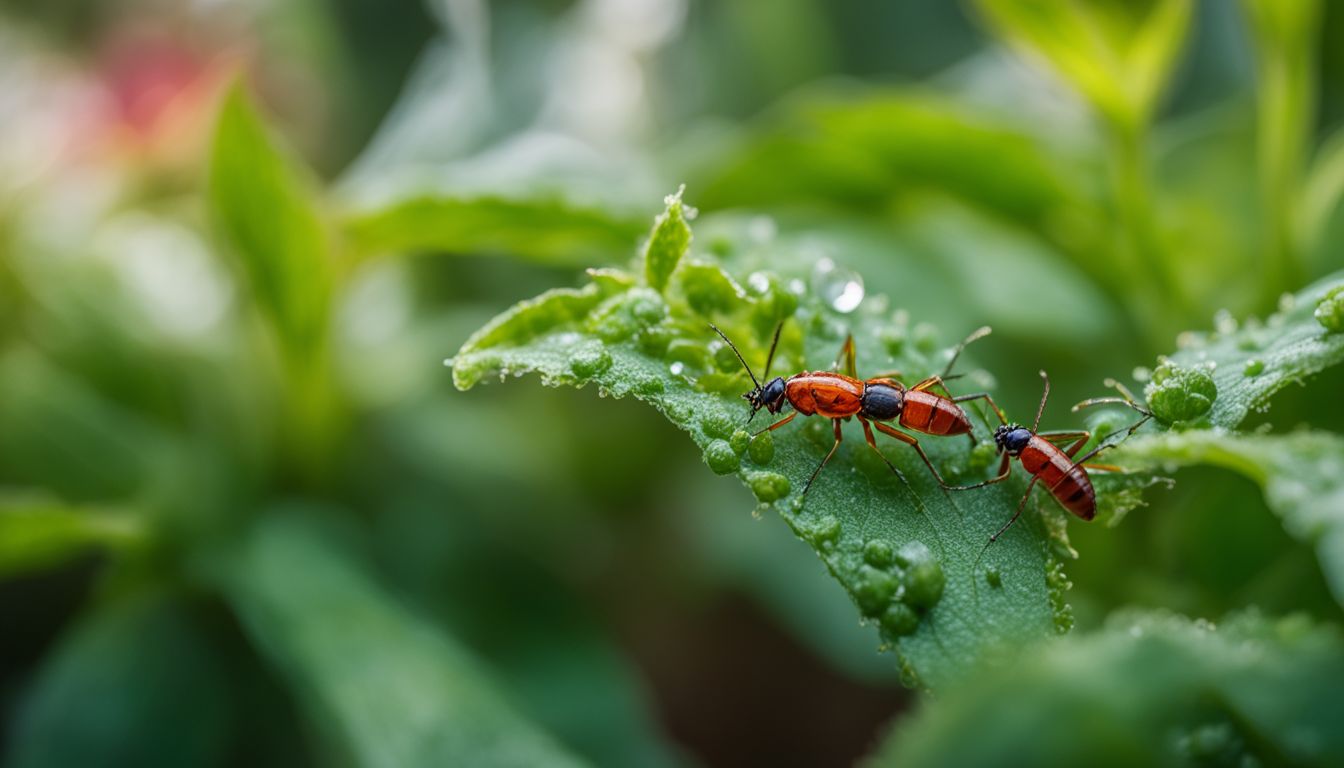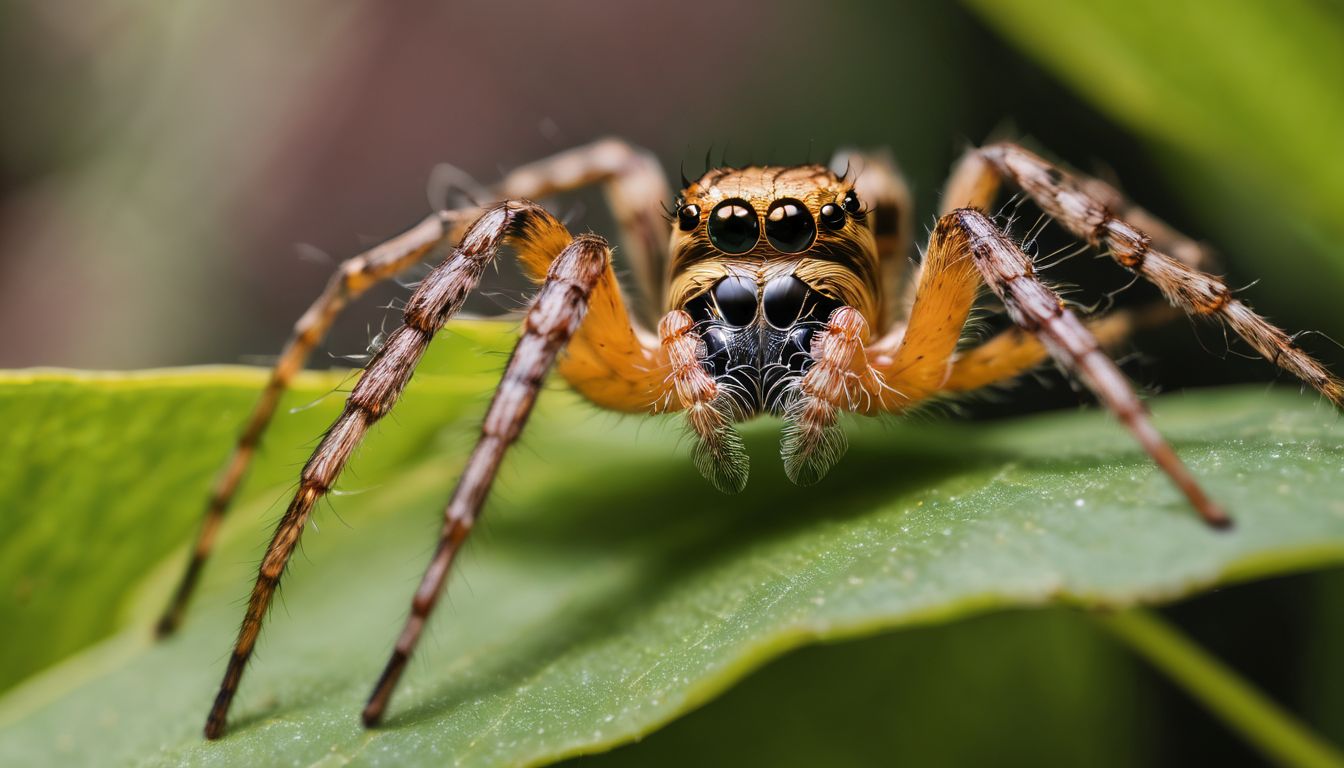Are aphids taking over your garden? Spiders are mother nature’s pest control, quietly feasting on these tiny insects. Our blog post will unravel the complex world of spiders and their appetites, including their role in eliminating aphids from your green haven.
Dive in to discover how eight-legged allies keep gardens healthy!
Key Takeaways
- Spiders do eat aphids, and they play a crucial role in maintaining garden health by controlling aphid populations.
- Spiders like jumping spiders and comb – footed spiders target aphids using various hunting techniques such as leaping onto prey or capturing them in intricate webs.
- Encouraging spiders in your garden can help reduce the need for harmful chemical pesticides and contribute to a balanced ecosystem.
Aphids: A Common Garden Pest

Spiders are not the only ones busy in the garden; aphids are there too, but they’re not helping. These tiny bugs use sharp parts in their mouths to poke into plants and drink the sap.
This sap is food for them, but it’s bad news for the plants.
Aphids can quickly make lots of baby aphids, forming big groups that take over new plant parts. They often hurt plants more than any other bug and come in about 4,000 different kinds! Each kind likes to eat different plant saps.
Because they grow fast and stick to one place once they start eating, you will usually find them grouped together on your plants.
The Dietary Habits of Spiders

Do Spiders Consume Aphids? Let’s explore the role of spiders in biological pest control and their potential impact on aphid populations.
Do Spiders Consume Aphids?
Spiders munch on many bugs and aphids are one of them. These tiny pests serve as a snack that’s packed with protein. Since spiders like to eat different things, they don’t always look for aphids first.
But when they find these small insects in the garden, they won’t pass up the chance for a meal.
Aphids can become food for all sorts of spider types. Whether it’s jumping spiders leaping at their prey or web-weaving orbweaver spiders trapping them, these eight-legged creatures help control aphid numbers.
This makes gardens healthier and plants happier without so many pests sucking their sap. Next, let’s explore how jumping spiders hunt down these pesky insects!
The Role of Spiders in Biological Pest Control
Now that we know spiders eat aphids, let’s explore how they help us by controlling pests. These eight-legged hunters act as a natural form of pest control in gardens and farms. They silently stalk their prey, keeping the number of harmful insects like aphids lower.
This helps farmers and gardeners because fewer aphids mean healthier plants.
Spiders are great at catching lots of different bad bugs that can hurt crops. When they hunt, they don’t harm the plants or the environment. Many people use them instead of chemicals to keep their gardens safe from pests.
They blend into nature and quietly do their job as helpful protectors of our green spaces.
Types of Spiders That Prey on Aphids
Jumping spiders are small but efficient hunters, using their keen eyesight and quick reflexes to catch aphids. Combfooted spiders, on the other hand, prefer to build webs where they can easily trap unsuspecting aphids for a meal.
Jumping Spiders and Their Hunting Techniques
Jumping spiders are agile hunters and use their keen eyesight to track down small insects, including aphids. They approach their prey stealthily and pounce with precision. Here are the hunting techniques of jumping spiders:
- These spiders use their quick reflexes to leap onto their unsuspecting prey.
- Jumping spiders have excellent vision, allowing them to spot aphids from a distance.
- They use their silk to build a safety line in case they miss a jump, enabling them to climb back up.
- With their powerful fangs, jumping spiders deliver a venomous bite to subdue aphids.
- After capturing an aphid, jumping spiders inject digestive enzymes into it and suck out the nutrients.
The Web-Building Combfooted Spiders
Comb-footed spiders, also known as tangle-web spiders or comb-footed spiders, are part of the Theridiidae family. They are skilled at trapping insects in their webs and wrapping them in more web material.
- Some species, like Mermessus denticulatus, consume more aphids than other spider species.
- Comb – footed spiders primarily feed on pests like flies and mosquitoes.
- There are over 1,000 species of comb – footed spiders found worldwide, including the notorious black widow.
- These spiders play a crucial role in biological pest control by targeting harmful insects in gardens.
- Known for their delicate and intricate webs, they effectively capture and immobilize their prey before dining on them.
Understanding Spider Biology
Spiders are cold-blooded and opportunistic predators that play a crucial role in maintaining garden health by preying on aphids. Understanding their biology can help us appreciate their value as natural pest controllers.
Are Spiders Cold-Blooded?
Spiders are cold-blooded animals. They don’t produce their own body heat, so they rely on the warmth from the environment to stay active and regulate their body temperature. This means that they are more active when it’s warm and tend to move less in cooler temperatures.
Understanding this aspect of spider biology can help us appreciate how they interact with their environment and manage their energy levels.
Understanding this about spiders helps gardeners know when these creatures are most likely to be active for pest control purposes, directly leading into our next topic about “The Impact of Spiders on Aphid Populations.”
The Impact of Spiders on Aphid Populations
Spiders play a crucial role in maintaining garden health by controlling aphid populations. By preying on aphids, spiders help prevent the spread of diseases like sooty mold and contribute to a balanced ecosystem in your garden.
How Spiders Contribute to Maintaining Garden Health
Spiders play a crucial role in maintaining garden health by serving as natural pest controllers. They help keep the population of unwanted insects, including aphids and caterpillars, in check.
By consuming agricultural pests, spiders indirectly benefit humans and contribute to biodiversity in the garden.
Their diet mainly consists of insect pests like aphids, grasshoppers, and caterpillars. This helps in preventing potential damage to plants caused by these pests. Spiders aid in biological pest control, reducing the need for harmful chemical pesticides that can harm other beneficial insects and organisms present in the garden ecosystem.
Considerations for Encouraging Spiders in Your Garden
Spiders play an essential role in maintaining garden health. Here are some useful considerations for encouraging spiders in your garden:
- Increase plant diversity in your garden to attract a variety of spider species that can help control pest populations.
- Reduce the use of insecticides, as these chemicals can harm beneficial spider populations.
- Avoid excessive tilling of soil, which can disrupt spider habitats and egg sacs.
- Provide shelter for spiders by leaving some areas of your garden undisturbed, such as leaf litter or untrimmed grass.
- Install plants that attract insects, like nectar – producing flowers, to provide a food source for spiders.
- Create a welcoming environment for beneficial insects that spiders feed on, such as ladybugs and lacewings.
Conclusion: Embracing Spiders as Natural Pest Controllers
In conclusion, spiders are natural pest controllers in the garden and they do eat aphids. They help maintain a healthy balance of insect populations. By encouraging spiders in your garden, you can benefit from their role as biological pest control agents.
Embracing these eight-legged helpers can contribute to a more balanced and diverse ecosystem in your outdoor space.
FAQs
1. Do spiders eat aphids?
Yes, many spiders are insect predators that eat bugs including aphids. They grab them in their webs or hunt them down.
2. Which spiders are good at catching aphids?
Orb weaver spiders and mesh-web weavers like the black and yellow garden spider often catch aphids in their sticky webs.
3. Are all spiders helpful in eating aphids?
Not all, but lots of spider types such as lynx spiders, crab spiders, and wolf spiders help control aphid populations by eating them.
4. Can I use spiders for biological control against pests like aphids in my garden?
Yes, you can! Spiders act as natural predators and help keep pest numbers low around plants without using chemicals.
5. Are big scary spiders like the brown recluse also eating these plant bugs?
Even though brown recluse or black widows might not specifically hunt for aphids, they do feed on various small insects which can include these tiny pests.




